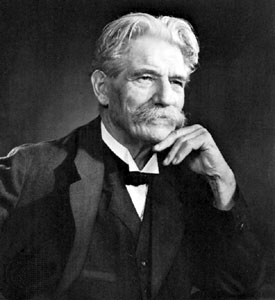

Albert Schweitzer was a Alsatian-German theologian, philosopher,
organist, and mission doctor in equatorial Africa, who received the 1952
Nobel Prize for Peace for his efforts in behalf of “the Brotherhood of
Nations.”
The eldest son of a Lutheran pastor, Schweitzer studied philosophy
and theology at the University of Strasbourg, where he took the
doctor’s degree in philosophy in 1899. At the same time, he was also a
lecturer in philosophy and a preacher at St. Nicholas’ Church, and the
following year he received a doctorate in theology. His book Von
Reimarus zu Wrede (1906; The Quest of the Historical Jesus) established
him as a world figure in theological studies. In this and other works he
stressed the eschatological views (concerned with the consummation of
history) of Jesus and St. Paul, asserting that their attitudes were
formed by expectation of the imminent end of the world.
During these years, Schweitzer also became an accomplished musician,
beginning his career as an organist in Strasbourg in 1893. Charles-Marie
Widor, his organ teacher in Paris, recognized Schweitzer as a Bach
interpreter of unique perception and asked him to write a study of the
composer’s life and art. The result was J.S. Bach: le musicien-poe`te
(1905). In this work Schweitzer viewed Bach as a religious mystic and
likened his music to the impersonal and cosmic forces of the natural
world.
In 1905 Schweitzer announced his intention to become a mission doctor
in order to devote himself to philanthropic work, and in 1913 he became
a doctor of medicine. With his wife, He'le`ne Bresslau, who had trained
as a nurse in order to assist him, he set out for Lambare'ne' in the
Gabon province of French Equatorial Africa. There, on the banks of the
Ogooue' (Ogowe) River, Schweitzer, with the help of the natives, built
his hospital, which he equipped and maintained from his income, later
supplemented by gifts from individuals and foundations in many
countries. Interned there briefly as an enemy alien (German), and later
in France as a prisoner of war during World War I, he turned his
attention increasingly to world problems and was moved to write his
Kulturphilosophie (1923; “Philosophy of Civilization”), in which he
set forth his personal philosophy of “reverence for life,” an
ethical principle involving all living things, which he believed
essential to the survival of civilization.
Schweitzer returned to Africa in 1924 to rebuild the derelict
hospital, which he relocated some two miles up the Ogooue' River. A
leper colony was added later. By 1963 there were 350 patients with their
relatives at the hospital and 150 patients in the leper colony, all
served by about 36 white physicians, nurses, and varying numbers of
native workers.
<information and photo fromhttp://www.britannica.com/EBchecked/topic/528657/Albert-Schweitzer>
|